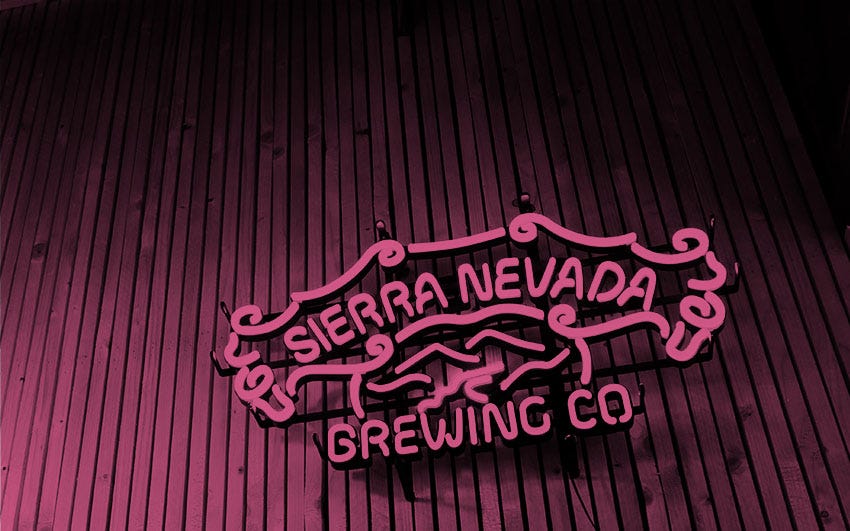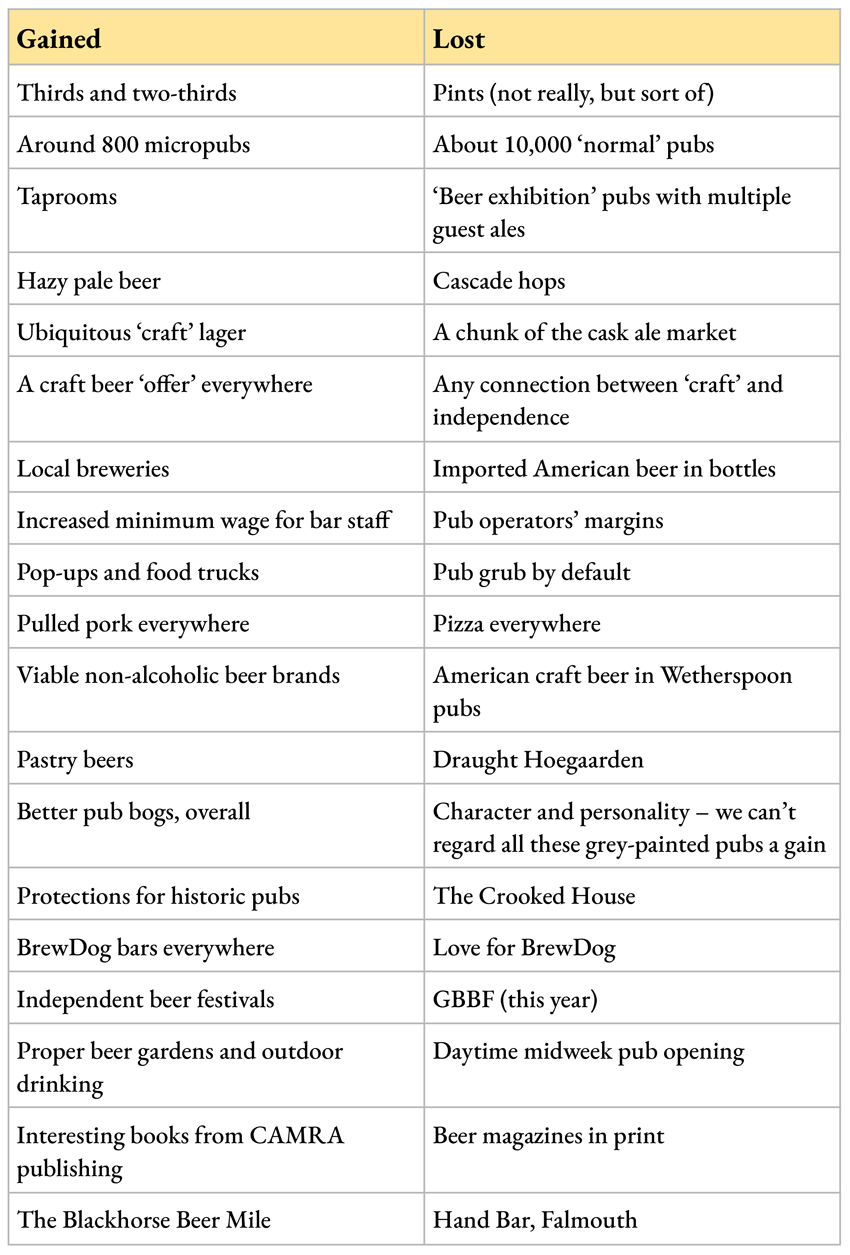What we’ve gained and what we’ve lost in a decade of British beer
It’s easy to be gloomy but what if we focus on what’s got better, and learn to let go of the past?
A lot has changed in British beer in the past decade or so. What have we gained? What have we lost? And is losing things always a tragedy?
We asked people on BlueSky the lost/gained question and got some interesting answers, which we’ve combined with our own pondering to get these twin lists.
We could probably keep going, and would like to hear your suggestions – especially if you’ve got one for each column, to balance the scales.
As it is, we can already hear some people saying “That’s not a bloody gain, you’ve got the columns the wrong way round!”
One we puzzled over was Fuller’s. Arguably, that was lost when, in 2019, it was acquired by Asahi. At the time, we were gutted. But… it hasn’t gone anywhere. Fuller’s pubs (a separate business) still serve Fuller’s beers, and they’re as good as ever. In December, drinking delightful pints of cask London Porter, it was hard to feel like this was anything but a gain.
See also Young’s, whose Ordinary (AKA Bitter, AKA London Original) tastes better today than it did when we first drank it more than a decade ago – wherever the hell it’s brewed these days.
Overall, though, this exercise has helped us think differently about change. Some of those gains strike us as real improvements in the overall health of our beer culture, and some of the losses are sad, but not the end of the world.
It’s hard not to worry about the threat to cask ale, traditional pubs, and family/regional brewers.
But a thought in Will Hawkes’s January newsletter grabbed our attention:
You cannot discuss the decline of pubs without acknowledging the huge changes in society that have taken place, and the new and varied options open to ordinary people that didn’t exist in 1890 or even 1980… So much of the hand-wringing over pubs is really disgruntlement at how society has changed – which is all very well, depending on your perspective, but it doesn’t get us very far.
To follow on from that, change might be painful, but it is natural.
We can all choose to fight for the things we want to keep – which, in the case of beer and pubs, means putting our money where our mouths are, one way or another.
Or we can appreciate them, document them, and remember them when they’re gone.
The idea of family/regional brewers in particular offers a philosophical challenge. Neither of us particularly believes in the idea of inheritance, on principle. Why should the child of the child of the child of someone who was a canny businessperson in the 1850s be the focus of our adulation and attention?
Perhaps breweries should pop into existence, blaze gloriously for a generation, then disappear to make room for something new.
Something that meets the needs of now, rather than serving nostalgia.
Going slightly viral on BlueSky
We’re not hugely invested in the success of any social network over another – and maybe we’d all be happier if social media just withered away.
But last weekend, without trying, we went slightly viral on BlueSky, which suggested to us that that network, at least, is beginning to pick up momentum.
We came across that snippet while researching a more in-depth (and, of course, largely ignored post…) on an unrelated subject.
Between Alan, above, and Thomas Walker, “the female barman” of Victorian London, it feels as if there’s some more research to be done – ideally by someone better qualified than us.
Contrary to their reputation as insular and conservation, were pubs, perhaps, particularly welcoming to trans people?
One thread we pulled in our book 20th Century Pub was the idea that part of the appeal of pubs, historically, was a sense that the usual rules of society didn’t quite apply.
Roast potatoes in the pub
We’ve started visiting The Swan With Two Necks more regularly, especially on Sunday afternoons. That happens to be when landlord Elmer has his pals around to DJ classic soul, sixties pop, and other mod music.
He also serves roast potatoes from a bowl on the bar. So, this event is called ‘Taters & Toons’.
They’re not the best roasties in the world, but they’re not bad, and they certainly do the job they’re intended to do: keep you in the pub for one or two more rounds, and soak up booze.
On our way home the other week, quite full already, we stopped at The Barley Mow for just one more. And, guess what? They finished their Sunday roast service and brought out all the leftover spuds in a big bowl on the bar.
These were, it has to be said, a notch up in terms of quality. You know when a roast potato makes a CRACK sound as you bite into it, and then oozes fat? That.
We’d love to say all pubs should have roast potatoes on Sunday afternoon but of course it’s a bit of a faff. Still, it’s nice when it happens.
On the blog
We kept up a fairly regular schedule of posting in January despite some stressful family stuff going on in the background. Or perhaps because of it? Over the years, the familiar routines of blogging have become quite comforting when things aren’t going to plan in the real world.
Responding to a blog post by beer memester Ross Cummins we listed our top five reliable pints in Bristol – a fascinating exercise, because it’s not the same as either best pubs, or best beers. After we’d written it, we felt obliged to go and check a couple of our suggestions. The Butcombe at The Langton was excellent, as we’ve come to expect… but we’re still not recommending anyone schleps out there specifically.
We’ve found that, lately, our posts and newsletters have begun to feel like one long interconnected pondering session. We were fascinated to visit a board game cafe for the first time and to find it busy and buzzing – just how people want pubs to be. Then, picking a book from 1927 off the shelf, we found a reference to games in pubs that made it feel like a piece of the same puzzle. FYI, we tried to go to the board game cafe yesterday but there was no space for us.
We gave an update on our visit to Bristol Archives, including notes on local licensing, and the curious absence of papers from the Bristol Courage operation (formerly George’s).
Most recently we wrote at some length about efforts by a Liverpool politician, Luke Hogan, to organise a union for bar staff in the 1930s and 40s.
There were also the usual weekly round-ups of news, nuggets and longreads, which have been easier to put together lately, thanks to a positive flood of interesting articles and blog posts.
We’ve also been mixing it up on Patreon with footnotes for those weekly round-ups, alongside our usual ‘beers of the weekend’ posts. Please do sign up if you want to support and encourage us.
And that’s it, that’s your lot, until March.
Cheers,
Jess & Ray







